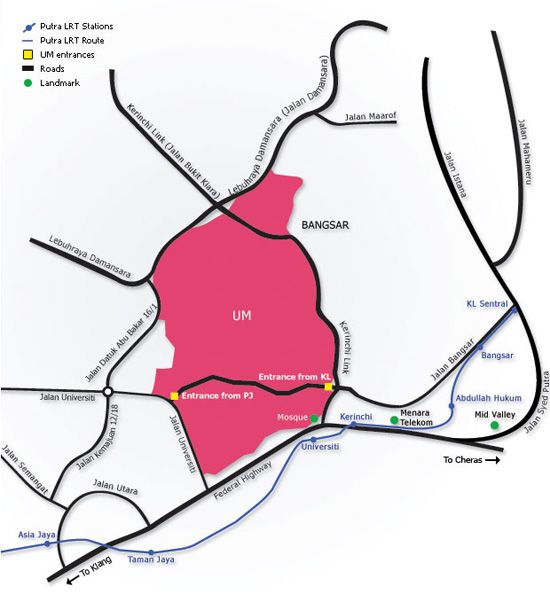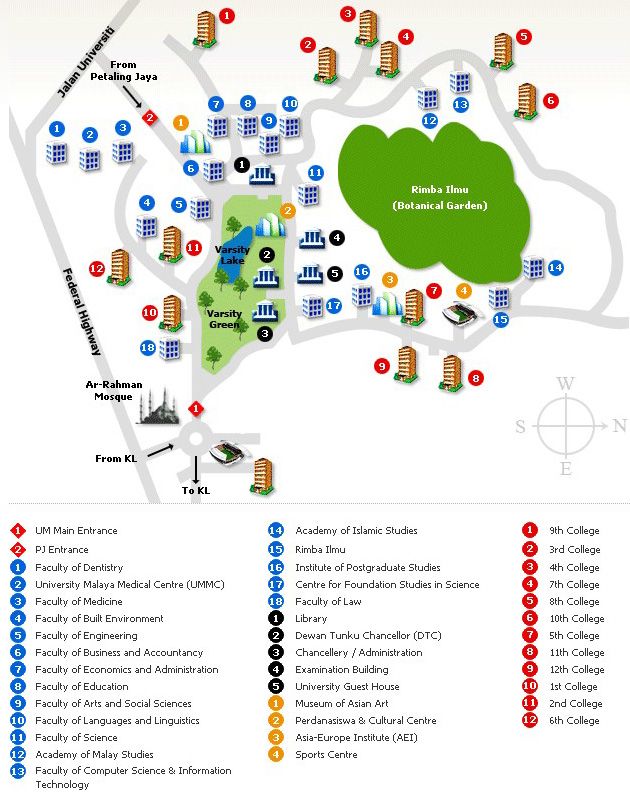University of Malaya – The oldest university in Malaysia
The University of Malaya (or Universiti Malaya in Malay; commonly abbreviated as UM) is the oldest university in Malaysia, and is situated on a 750 acre (3.0 km²) campus in southwest Kuala Lumpur, the capital city. It is widely recognised as one of the top university in Malaysia, and many prominent Malaysians are alumni of UM.
History
In September 1904, Tan Jiak Kim led a group of representatives of the Chinese and other non-European communities, and petitioned the Governor of the Straits Settlements, Sir John Anderson, to establish a medical school in Singapore. Tan, who was the first president of the Straits Chinese British Association, managed to raise $87,077, of which the largest amount of $12,000 came from himself. On 3 July 1905, the medical school was founded, and was known as the Straits and Federated Malay States Government Medical School. The medical library was first housed in the students’ reading room within the school, converted from the vacant old female lunatic asylum in Sepoy Lines.
In 1912, the medical school received a donation of $120,000 from the King Edward VII Memorial Fund, started by Dr Lim Boon Keng. Subsequently on 18 November 1913, the name of the school was changed to the King Edward VII Medical School. In 1921, it was again changed to the King Edward VII College of Medicine to reflect its academic status.
In 1929, Raffles College was established to promote arts and social sciences at tertiary level for Singapore students.
Two decades later, Raffles College was merged with the King Edward VII College of Medicine to form the University of Malaya on 8 October 1949. The two highly respected institutions were merged to perform together an even greater service by providing for the higher education needs of the Federation of Malaya and Singapore and to help lay the foundations of a new nation by producing a generation of skilled and educated men.
The growth of the University was very rapid during the first decade of its establishment and resulted in the setting up of two autonomous Divisions in 1959, one located in Singapore (which later becoming the National University of Singapore) and the other in Kuala Lumpur (retaining the name University of Malaya).
In 1960, the government of the two territories indicated their desire to change the status of the Divisions into that of a national university. Legislation was passed in 1961 founding the University of Malaya on 1 January 1962.
The university motto, “Ilmu Punca Kemajuan” (Knowledge is the Key to Success), reflects the philosophy of the University in its constant endeavour to seek knowledge in all fields to produce successful graduates and a successful nation.
On June 16th 1962, University of Malaya celebrated the installation of its first Chancellor, the Rt. Hon. Tunku Abdul Rahman Putra Al-Haj, who was also the country’s first prime minister. The first Vice-Chancellor was Professor Oppenheim, a world-renowned Mathematician.
Currently, His Royal Highness Duli Yang Maha Mulia Paduka Seri Sultan Perak Darul Ridzuan Sultan Azlan Muhibbuddin Shah ibni Almarhum Sultan Yussuf Izzuddin Shah Ghafarullahu-Lah is the Chancellor of Universiti Malaya.
Universiti of Malaya is headed by a lady for the first time when Datuk Rafiah Salim took over as the ninth Vice-Chancellor on 8th May 2006.
The university was ranked 89th in the 2004, and dropped to 169, in the 2005, among the world’s best universities table, according to The Times’ Higher Education guide. THES Ranking 2006 for world university brought University of Malaya to 192 position. In 2007, it has dropped out of the list of top 200 universities in the world.
Undergraduates > List of Programmes
Faculty of Arts and Social Sciences
Bachelor of Arts (BA)
– Administration and Social Justice
– Anthropology and Sociology
– East Asian Studies
– English
– Environmental Studies
– Gender Studies
– Geography
– History
– Indian Studies
– International and Strategic Studies
– Mathematics
– Media Studies
– Population Studies
– South East Asia Studies
– Tionghoa Studies
– Township and Urban Planning Studies
Faculty of Business and Accountancy
Bachelor of Accounting (BAcc)
Bachelor of Business Administration (BBA)
Faculty of Computer Science & Information Technology
Bachelor of Computer Science (BCompSc)
– Artificial Intelligence
– Computer Networking and System
– Management Information System
– Software Engineering
Bachelor of Information Technology (BInfoTech)
– Information Science
– Management
– Multimedia
Faculty of Dentistry
Bachelor of Dental Surgery (BDS)
Faculty of Economics & Administration
Bachelor of Economics (BEc)
Faculty of Education
Bachelor of Counselling (BCoun)
Bachelor of Early Childhood Education [BEd(ECEd)]
Bachelor of Education (TESL)
Faculty of Engineering
Bachelor of Biomedical Engineering (BBMedE)
Bachelor of Engineering (CAD/CAM) [BE(CAD/M)]
Bachelor of Engineering (Chemical) [BE(Chem)]
Bachelor of Engineering (Civil) [BE(C)]
Bachelor of Engineering (Electrical) [BE(E)]
Bachelor of Engineering (Environmental) [BE(Env)]
Bachelor of Engineering (Manufacturing) [BE(Mfg)]
Bachelor of Engineering (Materials) [BE(Mats)]
Bachelor of Engineering (Mechanical) [BE(Mech)]
Bachelor of Engineering (Telecommunications) [BE(Tel)]
Bachelor of Engineering in Computer (BEng. Electrical)
Faculty of Languages and Linguistics
Bachelor of Languages and Linguistics
– Arabic
– Chinese
– English
– French
– German
– Italian
– Japanese
– Spanish
– Tamil
Faculty of Law
Bachelor of Jurisprudence (External) [B.Juris(Ext)]
Bachelor of Laws (LLB)
Faculty of Medicine
Bachelor of Biomedical Science (BBMedSc)
Bachelor of Medicine and Bachelor of Surgery (MBBS)
Bachelor of Nursing (BNSc)
Bachelor of Pharmacy (BPharm)
Faculty of Science
Bachelor of Science (BSc)
– Actuarial and Financial Mathematics
– Applied Geology
– Biochemistry
– Biohealth Science
– Bioinformatics
– Biotechnology
– Chemistry
– Ecology and Biodiversity
– Environmental Science and Management
– Genetics and Molecular Biology
– Geology
– History and Philosophy of Science
– Mathematics, Statistics, Industrial and Computational Mathematics
– Microbiology
– Physics
Bachelor of Science Education (BScEd)
Faculty of the Built Environment
Bachelor of Architecture (BArch)
Bachelor of Building Surveying (BBuildSurv)
Bachelor of Estate Management (BEstMgt)
Bachelor of Quantity Surveying (BQSurv)
Bachelor of Science Architecture (BScArch)
Postgraduates > List of Programmes
Faculty of Arts and Social Sciences
Doctor of Philosophy (Ph.D)
Master of Arts (Civilisational Studies)
Master of Arts (English Literature)
Master of Arts (Malaysia History)
Master of Arts (Southeast Asian History)
Master of Publishing Studies (MPS)
Master of Strategic and Defence Studies (MSDS)
Faculty of Business and Accountancy
Doctor of Philosophy (Ph. D)
Master of Business Administration (MBA)
Master of Management (MM)
Faculty of Computer Science & Information Technology
Doctor of Philosophy (Ph.D)
Master of Computer Science (Data Communication & Computer Network)
Master of Computer Science (Management Information Systems)
Master of Computer Science (Multimedia)
Master of Information Technology (MInfTech)
Master of Library And Information Science (MLIS)
Master of Software Engineering (MSE)
Faculty of Dentistry
Doctor of Philosophy (Ph. D)
Master of Clinical Dentistry (MClinDent)
Master of Dental Science (MDSc)
Master of Dental Surgery (MDS)
Master of Orthodontics (MOrto)
Master of Public Health (Oral Health)
Master of Science (Dental Public Health)
Faculty of Economics & Administration
Doctor of Philosophy (Ph. D)
Master of Applied Statistics (MAppStat)
Master of Economics (MEc)
Master of Public Administration (MPA)
Faculty of Education
Doctor of Philosophy (Ph.D)
Master of Counselling (MCouns)
Master of Early Childhood Education [MEd(ECEd)]
Master of Education (MEd)
Master of Educational Management (MEdM)
Master of Instructional Technology (MInstTech)
Master of Mathematics Education with Information Communication and Technology (MMathEd with ICT)
Master of Science Education with Information Communication and Technology (MScEd with ICT)
Faculty of Engineering
Doctor of Philosophy (Ph.D)
Master of Engineering (MEng)
Master of Safety Health and Environment
Master of Science Engineering (MEngSc)
Faculty of Languages and Linguistics
Doctor of Philosophy (Ph. D)
Master of English as a Second Language
Master of Linguistics
Master of Modern Language Studies
Faculty of Law
Doctor of Philosophy (Ph.D)
Master of Criminal Justice (MCJ)
Master of Laws (LLM)
Faculty of Medicine
Doctor of Medicine (MD)
Doctor of Philosophy (Ph.D)
Master of Anaesthesiology (MAnaes)
Master of Clinical Oncology
Master of Emergency Medicine
Master of Family Medicine (MFamMed)
Master of Internal Medicine (MIntMed)
Master of Medical Physics (MMPhysics)
Master of Medical Science (MMedSc)
Master of Medical Science in Clinical Pathology (Forensic Pathology) [MMedScClinPath(ForensicPath)]
Master of Medical Science in Public Health (MMedScPH)
Master of Obstetrics and Gynaecology (MObGyn)
Master of Ophthalmology (MSOphtal)
Master of Orthopaedic Surgery [MS (Ortho)]
Master of Otorhinolaryngology (Head and Neck Surgery) [MS(ORL)]
Master of Paediatrics (MPaeds)
Master of Pathology (MPath)
Master of Psychological Medicine (MPM)
Master of Public Health (MPH)
Master of Radiology (MRad)
Master of Rehabilitation Medicine (MRM)
Master of Sports Medicine (MSM)
Master of Surgery (MS)
Faculty of Science
Doctor of Philosophy (Ph.D)
Doctor of Philosophy (Ph.D) (Maths)
Doctor of Philosophy (Ph.D) (Science Philosophy)
Master of Biotechnology (MBiotech)
Master of Science (Analytical Chemistry & Instrumental Analysis)
Master of Science (except Maths & Science Philosophy)
Master of Science (Full Research)
Master of Science (Maths)
Master of Science (Petroleum Geology)
Master of Science (Philosophy of Science and Science & Technology Policy Studies)
Master of Science (Science Philosophy)
Master of Science (Statistics)
Master of Technology (Environmental Management) [MTech(EnvMgt)]
Master of Technology (Materials Science) [MTech(MatSc)]
Faculty of the Built Environment
Doctor of Philosophy (Ph. D)
Master of Real Estate
Master of Science (Architecture)
Master of Science (Building)
Master of Science (Real Estate)
Facilities and Services
University of Malaya Library
The University of Malaya Library (UML) offers a substantial collection of monographs, periodicals, manuscripts, audiovisual materials and compact discs, consisting of over 1.2 million volumes of monographs, bound journals and manuscripts and journal subscriptions. Electronic materials are substantively acquired by subscription to 39 index/abstract and full-text databases either in CD-ROM or online access. Other than the subject collections pertaining to their respective faculties, a few branch and special libraries hold some unique collections and extensive materials relating to the respective faculties and field of studies.
ICT Services
Pusat Teknologi Maklumat (PTM) provides the necessary infrastructure, services and resources for ICT services in University of Malaya, and its campuses. From managing the Internet and Intranet of the University to providing computing resources to the various faculties, PTM also ensures the security & integrity of the systems used on campus, especially in many of the Research and Development work the University endorses.
The Centre has five operating divisions:
– Network & Customer Services Division
– ICT Planning, Security & Training Division
– Collaborative & Communicative Applications Division
– Administrative Applications Division
– Data Centre Management Division
University of Malaya Co-op
Facilitating campus life, the University of Malaya Co-operative provides services that aid campus society. Responsible for the administration of the University Bookshop, the largest and the best-stocked university bookshop in the country, UC Travel agency, an electrical goods outlet, a computer outlet and a mini market, the Co-op plays a big role in the overall amenities UM provides.
University of Malaya Press
The Department of Publications (UM Press) provides the following services:
– Publishing
Publisher of quality books to serve the community of scholars as well as non-specialist readers outside the academic world.
– Printing
PRE-PRESS: Typing, typesetting, design and layout.
PRINTING: Books, magazine, brochures, booklets, newsletter, posters, catalogues, name card, letterhead, invitation cards.
BINDING: Wire-stitching, comb binding, perfect binding.
– Editorial
Translation services, editing, proof reading, editorial consultants. Workshop
– Seminars and workshop
On publishing and printing, writing, editing, translation, book production, multimedia, publishing and printing management, marketing and promotion.
Residential Colleges
Moving away from home to study at a university is an exciting time in a student’s life. There are new friends to be made, new places to discover and the chance to develop many new interests. University of Malaya boasts 13 residential colleges that can accommodate up to 12,000 students. This amount represents about 65% of all the students pursuing their first degrees. Each residential hall is administered by a principal and assisted by several fellows. The Residential Halls do not only provide students with accommodation but also facilities such as game courts, reading rooms, grocery shops, cyber cafes and computer labs.
Security
Campus safety and security are as important to the University as the academic excellence of its students. With services such as safety patrols, traffic control, security posts, vehicle registration as well supervising the distribution of Campus Security Passes, the University’s Security Office provide peace of mind to campus residence.
Financial and Banking Services
There are three banking services on campus which provide banking facilities and service to students and staff on campus. Bank Bumiputra Commerce Berhad is situated at the Bursa Building, Bank Simpanan Nasional is located at the Faculty of Arts and Social Sciences and Bank Islam at the Examination Complex.
Food Court and Catering Services
Most academies, centres, faculties and institutes have their own canteens for students and staff. There are also cafes and cafeterias situated at various strategic places around the campus such as in the Perdanasiswa building and Baktisiswa building. There is a wide variety of food ranging from local flavours like rice and noodles to Western food at affordable prices. Tastefully furnished and hygienic, these eateries are always a favourite choice among staff and students alike.
Transportation and Travel
Getting in and around the campus is convenient thanks to an abundance of transportation options servicing the University. From the University’s own LRT stop and feeder bus routes to general public transportation. Additionally, students with the University car sticker have the benefit of driving into and parking on University grounds. Off campus students may also use the university bus service to travel back and forth to the campus.
Location map
 Location map of University of Malaya
Location map of University of MalayaCampus map
 Campus map of University of Malaya
Campus map of University of MalayaContact details
Undergraduate Admissions for Local Student
Admission, Records & Policy
Implementation Section
Examination Building
University of Malaya
50603 Kuala Lumpur
MALAYSIA
Tel: +603-7967 3279 / 3440 / 3441 / 3502
Fax: +603-7967 3449
E-Mail: skr@um.edu.my
Postgraduate Admissions for Local & International Student
Postgraduate Admissions Section
Institute of Postgraduate Studies
University of Malaya,
50603 Kuala Lumpur,
MALAYSIA
Tel: +603-7967 4623 / 4517 / 4659
Fax: +603-79674606 / 7956 8940 / 7956 6634
Email: ips@um.edu.my
International Student : Undergraduate Admissions
International Student Centre,
International and Corporate Relations Office (ICR),
Level 1, Canseleri Building
Universiti Malaya,
50603 Kuala Lumpur:
Tel: +603-7967 7711
Fax : +603 -79677710
E-Mail : isc@um.edu.my
General question about University of Malaya
International and Corporate Relations Office (ICR),
Level 1, Canseleri Building
Universiti Malaya,
50603 Kuala Lumpur
Tel: +603-7967 7022/3273
Fax:+603-7956 0027
Email : icr@um.edu.my
Website: http://www.um.edu.my/
